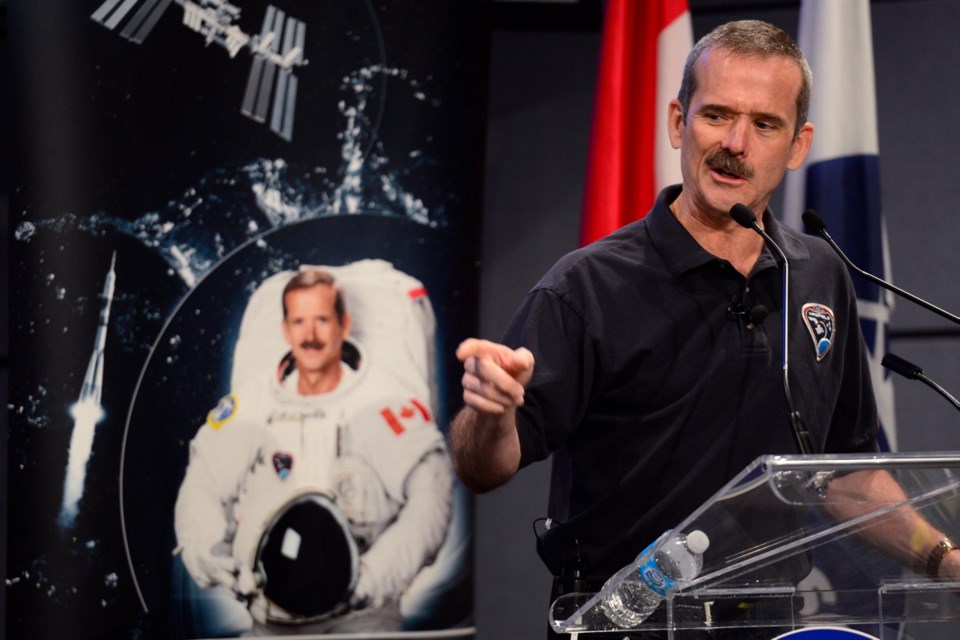So much for the way astronaut Chris Hadfield fired up Canada’s schoolchildren. No sooner did he get them gazing at the heavens than Stephen Harper brought them down to Earth.
We just discovered Ottawa is pulling the plug on the education programs at the Centre of the Universe. For those of you with an aversion to book learnin’, that’s the interpretive centre beside the Dominion Astrophysical Observatory in Saanich.
Peer really hard at the photos Hadfield shot from the International Space Station, and you can just about make it out. (For those of you in the Conservative caucus, the space station is the one where you sacrifice a virgin every time it flies overhead. It orbits 16 times a day. That’s a lot of virgins. Good luck with that in Ottawa.)
As cost-cutting measures go, this is more like a nick: a savings of just $245,000 when they cut public access at the end of the summer.
What makes it newsworthy is that it comes just as Hadfield has been lauded for getting Canadian children excited about the universe around them. It also follows a pattern in which the ruling party appears to view scientists — or at least scientists whose work doesn’t have a commercial application — as pointless at best and, at worst, a bunch of pipeline-blocking, fish-hugging, communist hippies.
Putting so little value on inspiring young minds just reinforces the image of the Conservatives as being dismissive of science, wilfully blind to any unwanted information that gets in the way of what Stephen Colbert calls “truthiness” — the truth as we would like it to be, unsullied by inconvenient evidence. Truthiness allows politicians to leap to conclusions, to make decisions unencumbered by facts.
All parties use truthiness. When the federal Liberals were in power, they decided cabinet ministers, not scientists, should choose which animals to put on Canada’s list of species at risk. If an animal wasn’t on the list, they wouldn’t have to make sticky political decisions about protecting it.
It was the Conservatives, though, who really turned off the flow of scientific information. In 2007, they ordered government scientists to refrain from speaking in public without the permission of those high up the political food chain. The policy is so rigid that the Ottawa Citizen reported that a scientist needed authorization from political appointees before discussing a report on flooding that occurred 13,000 years ago.
The strategy works, too. In 2010, a leaked Environment Canada paper showed science reporting had virtually dried up since Harper ordered the scientists silenced. “Media coverage of climate-change science, our most high-profile issue, has been reduced over 80 per cent.”
This makes for good politics, because an ignorant public is a happy public. Politicians need not deal with pesky problems if the scientists aren’t allowed to warn us about them. (Remember 2011, when a Nanaimo fisheries scientist wasn’t allowed to discuss her research into why salmon stocks were crashing.)
Meanwhile, the cutting continues. The Conservatives have done away with anyone dealing with marine pollution (including researchers at the Institute of Ocean Sciences at Patricia Bay), closed an Arctic observatory critical to global-warming research, chopped an acid-rain program, killed the National Round Table on the Environment and the Economy, cut funding to the National Research Council and other science-based agencies, whacked the Office of the National Science Advisor (the independent voice who advised the prime minister on scientific questions) and weakened the Environmental Assessment Act, Navigable Waters Protection Act and Fisheries Act. Oh, yeah, Hadfield’s Canadian Space Agency has taken a hit, too.
When research money is available, it is narrowly targeted. Scientific inquiry must be “business led and industry relevant,” meaning there’s little left for exploring the heavens, marine toxicology, climate science or marine biology, the Green party’s Elizabeth May told the Times Colonist’s Cindy Harnett.
It shouldn’t be an either/or proposition. A knowledge-based economy (note that on the same day we heard of the cuts to the Centre of the Universe, the association representing Victoria’s $3-billion-a-year high-tech sector handed out its awards) is fuelled by people with the hunger to learn, to push the boundaries — people who got their inspiration looking through a telescope and seeing nothing but possibility.



